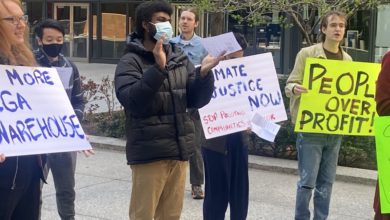Earlier this year, the inhabitants of the Carteret Islands became the first modern climate refugees. For the first time in history, an entire people has been resettled due to rising sea levels owing to anthropogenic (man-made) climate change. The predictions that climate change will drastically affect life—human and otherwise—around the world are no longer just abstract, doom-and-gloom forecasts: those forecasts have become reality.
Immediate action is needed; the time to avoid the climate crisis has come and gone. We are seeing its early stages.
The Obama administration made big news recently by announcing new Environmental Protection Agency guidelines, which are intended to reduce carbon dioxide emissions from power plants by 30 percent by 2030. The new guidelines come out of a broader campaign by the United States government to gradually scale back greenhouse gas emissions.
The EPA guidelines come not a minute too early, given the burgeoning climate catastrophe. Without immediate, far-reaching action, sea levels will continue to rise; rain over inland areas, where most of the world’s farmland is located, will become increasingly unpredictable and rare and seawater will become more and more acidic, threatening countless marine plant and animal species.
While the new guidelines come at the right time, they do not adequately address the crisis because they overlook the titanic scale of the problem. Power plant emissions make up only about a third of all US greenhouse gas emissions. Since the plan would reduce that third by 30 per cent, it would cut back total greenhouse gas emissions by about 10 per cent.
Meanwhile, the Obama administration and Congress have continued construction of the Keystone XL Pipeline, steamrolling the broad base of opposition along the way. The pipeline would move tar sands from Canada to the refinery-rich Gulf Coast to keep a steady flow of oil. Tar sands have only become profitable due to the increasing rarity of new oil reserves, making oil exploration increasingly costly. In other words, the rising market-wide costs of oil exploration have just recently caught up with the cost of tar sand production.
The exploitation of tar sands is consequently a last-ditch effort to maintain an oil-based energy sector. If the U.S. government is serious about addressing climate change, it should not go through such desperate efforts at keeping oil lines flowing.
Transportation makes up 28 percent of the U.S. greenhouse gas emissions: if the U.S. government were serious about addressing climate change, it would take on transportation and energy production together, which combined make up 60 percent of U.S. greenhouse gas emissions.
Bogus international leadership
Even if the EPA guidelines did take bigger steps against climate change, they would still be insufficient to address climate change. The United States is one of the biggest polluters in the world, but even if serious measures were taken in the United States, it would not be enough, since emissions come from around the world.
Rhetoricians at the White House understand this reality, which has led to their controversial new focus on health, rather than on climate change. Rather than focusing on the more serious and far-reaching effects of runaway climate change, the Obama administration has chosen to sell the EPA regulations discussing asthma, undrinkable water and other effects of pollution on health. It is correct that pollution causes mass public health problems, but the threshold to avoid those problems is much lower than to avoid runaway global climate change.
This rhetorical shift is consequently a colossal step backwards: climate change has been the centerpiece of climate regulation since the 1990s. The bar has been set higher since then, since nearly all climate scientists agree that the impacts of climate change are far more severe: it is possible to reduce pollution enough to avoid the public health problems that have become the Obama administration’s talking points. It is not possible to reduce emissions enough to address climate change without also reducing emissions to avoid these public health problems.
Claims that the new EPA regulations let the United States take on international leadership are especially transparent in this regard. In an NPR interview, EPA administrator Gina McCarthy stated “If we [the United States] don’t show global leadership here… we do not believe a global solution is possible.” Implicating China as the other largest emitter of greenhouse gasses, McCarthy argued that the new regulations “can provide some international leverage.”
As one of only a handful of countries which never ratified the Kyoto Protocol, the United States has no ground to stand on in claiming international leadership in responding to climate change. While China may be the largest emitter of greenhouse gasses today, it only assumed that role recently; the United States has been a leading polluter since it industrialized over 100 years ago.
China is also the world’s largest investor into clean energy, and is only able to do so because of economic planning—because of its socialist economy, however diminished—which separates profit from energy policy. Despite McCarthy’s veiled criticism of China, the PRC is showing better international leadership on climate change than the United States.
Sacrificing workers; sparing energy companies
The regulations have earned criticism as economically dangerous to workers employed in the coal industry, since coal power plants are the targets of the new policies. While fossil fuel-fired power plants are the largest single source of carbon emissions in the United States, those who suffer from downsizing coal plants are not energy companies, but rather workers.
In fact, new guidelines could lead 224,000 workers to lose their jobs *each year* until 2030. The southeast—one of the poorest areas of the United States—would be hardest hit, since coal mining and coal-fired plants make up significant parts of the economy there.
As jobs become scarcer, poor and working people will also shoulder higher energy costs.
Why is the working class the hardest hit when steps are taken to respond to climate change?
This cruel sacrifice of poor and working people shows the inevitable double-bind with climate responses under capitalism. Poor and working people have far more to lose as rising sea levels swallow homes and entire neighborhoods and cities, since they cannot simply move elsewhere. Poor and working people will be the first to feel the effects of rising food costs, thanks to prolonged drought, species loss and ocean acidification.
On the other hand, energy companies—beholden to profit first—will cut workers’ wages, hours, pensions and employment rolls before they cut their bottom lines. Because energy companies are bound to profit margins, the EPA’s hope that energy companies will pay for the costs of transition and less profitable energy sources is pure fantasy.
If climate change is left unchecked, workers around the world face disaster, especially in underdeveloped areas where there are few resources to provide relief climate refugees and those left hungry in face of food scarcity. Capitalist “climate responses” are not only insufficient to take on the scale of climate change, but also sacrifice workers to spare energy companies.
Short of serious effort to avoid climate catastrophe, climate crisis will confront the great mass of life on Earth. If the EPA were actually concerned with avoiding that crisis to those who will be impacted first and hardest, it would spare poor and working people price hikes, reduced wages and unemployment by mandating price freezes on utilities and no layoffs, pay cuts or hours reductions. Instead, it has acquiesced by demanding only modest changes without protecting workers.
Capitalism stands in the way of real progress on the climate issue. Capitalism can neither take on the scale of climate change, nor protect those most vulnerable to its effects. It cannot respond comprehensively to avoid climate catastrophe.
Poor and working people around the world should make the revolutionary demand for climate justice: a real response to reduce atmospheric greenhouse gasses *and *protect life before profits.







